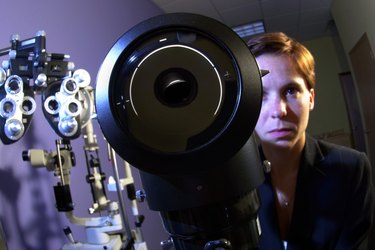
If you're like most Americans, you consume more protein than you need, says the Centers for Disease Control and Prevention. While your body needs adequate protein to build and repair muscle tissue and to synthesize essential compounds like enzymes, too much can increase your risk of a variety of problems, especially if the bulk comes from animal sources. There are no scientific studies directly linking excess protein intake to an increased risk of eye problems. Over time, however, some medical conditions exacerbated by too much protein may affect the health of your eyes. Talk to your doctor if you're having trouble determining how much protein is right for your dietary needs or if you're experiencing eye problems.
How Excess Protein Affects Your Health
Video of the Day
Eating too much protein won't directly damage your eyes. It can, however, cause you to gain weight. That's because excess protein in your diet -- just like excess carbohydrates or fat -- is stored as body fat if your total daily caloric consumption is greater than the amount of calories you burn. Having overweight or obesity increases your likelihood of developing type-2 diabetes, a condition that may affect eye health. Too much protein in your diet may also cause diarrhea, nausea and dehydration and may increase your risk of kidney stones, kidney disease, osteoporosis and some types of cancer.
Video of the Day
Eye Problems Associated With Diabetes
According to the American Diabetes Association, a person with diabetes is 60 percent more likely than a person without diabetes to develop cataracts. You may also develop them at an earlier age, and the condition may be more aggressive than it is in people without diabetes. The risk of glaucoma, a problem that occurs when built-up pressure in the eye inhibits blood from reaching the optic nerve and retina, is 40 percent higher for people with diabetes. Macular edema, or excess fluid in the eye and nonproliferative or proliferative retinopathy, conditions in which the eye's capillaries swell and may become damaged, are also connected to diabetes.
Effect of Strokes on the Eyes
Animal protein sources -- red meat, poultry, dairy products -- can be high in total and saturated fat. Excess saturated fat consumption may be linked to cardiovascular disease and stroke. A large percentage of people who've had strokes report eyesight problems afterward, says the National Stroke Association. These can range from blindness in one eye or part of the field of vision in one or both eyes to seeing double, perceiving objects to be in a different place than they are or trouble recognizing colors or depth. Limiting your intake of animal proteins, selecting low-fat choices like skinless poultry or nonfat milk and eating more plant-based proteins such as beans, legumes, nuts and seeds can help lower the chance of stroke.
Recommended Protein Intake
The CDC advises that the average man should have approximately 56 grams of protein each day, while a woman needs around 46 grams daily. Have 8 ounces of nonfat yogurt at breakfast, 1 cup of bean soup at lunch and 3 ounces of grilled salmon with dinner, and you're already at 48 grams. Serious athletes, such as weightlifters, may require more protein daily. To protect your eyes and your overall health, aim to focus your regular protein intake at between 10 percent and 35 percent of your total calories per day.